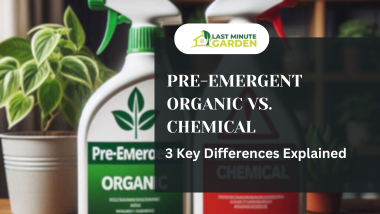Choosing the right pre-emergent organic is critical for effective weed control. It is equally important to know how organic and chemical options stack up across safety, effectiveness, and sustainability.
Weed control remains a top priority for any gardener or farmer looking to maintain healthy crops. Pre-emergent herbicides, which target weeds before they even sprout, are a critical tool in this process. While conventional chemical pre-emergents are widely used, organic options are gaining popularity due to environmental and health considerations.
This article explores three key differences between pre-emergent organic and chemical solutions, equipping you with the knowledge to choose the best approach for your garden or farm.
1. Composition and Mode of Action
Organic Pre-Emergents: Pre-emergent Organic typically uses natural substances like corn gluten meal. These compounds prevent weed seeds from germinating without introducing synthetic chemicals into the soil.
Corn gluten meal, for instance, is known to inhibit root development in seedlings, making it effective in reducing weed populations in lawns and garden beds. This approach relies on natural processes, breaking down harmlessly into the soil over time.
Chemical Pre-Emergents: Chemical pre-emergents, on the other hand, are synthesized from active ingredients specifically formulated to block weed seed germination. Compounds such as pendimethalin or prodiamine interrupt cell division in weeds, preventing new plants from establishing.
While effective, these chemicals are persistent and may remain in the soil long after application, potentially affecting surrounding plants and soil health.
Key takeaway: Organic pre-emergents focus on natural weed control with minimal impact on soil life, while chemical options use engineered compounds for more immediate and targeted results.
2. Environmental and Soil Health Impact
Pre-Emergents Organic: One of the primary advantages of organic pre-emergents lies in their reduced environmental footprint. As organic solutions are biodegradable, they decompose safely without leaving residual toxins in the soil.
This characteristic supports soil biodiversity, encouraging beneficial organisms that help maintain soil fertility. Organic pre-emergents also minimize the risk of chemical runoff into nearby water sources, an essential factor in sustainable agriculture.
Chemical Pre-Emergents: Chemical options, while highly effective at weed control, can have a more significant environmental impact. Persistent residues can disrupt soil microbiota, affecting both beneficial bacteria and fungi that aid plant health.
Additionally, runoff from chemical herbicides poses a threat to nearby waterways, potentially harming aquatic ecosystems. Although some chemical pre-emergents are formulated to minimize soil binding, their prolonged presence can affect soil properties over time, reducing biodiversity and altering soil texture.
Key point: Organic pre-emergents offer an environmentally friendly option that promotes long-term soil health, whereas chemical pre-emergents may pose ecological risks if used excessively or without careful management.
3. Effectiveness and Application
Organic Pre-Emergents: pre-emergent organic are generally effective for specific types of weeds and are often best applied as part of an integrated weed management plan. However, they may require more frequent applications and may not provide as immediate or comprehensive control as chemical pre-emergents.
The effectiveness of organic solutions can vary based on environmental conditions such as moisture and temperature, and they may be less reliable for certain persistent weed types.
Chemical Pre-Emergents: Chemical pre-emergents are highly efficient, often providing long-lasting weed control with a single application. Many are engineered to withstand varying environmental conditions, making them effective in a wide range of climates and soil types.
However, improper application or overuse can lead to resistance in certain weed species, necessitating a rotating or integrated approach for sustained effectiveness.
Main Point: Chemical pre-emergents often deliver fast, reliable results across diverse weed types, whereas organic pre-emergents may need more consistent application and are best suited to selective weed control within a broader management plan.
Final Tips for Choosing the Right Emergency
- Assess your weed type and soil needs: Identify the most persistent weeds in your area and choose a pre-emergent suited to those specific types. Organic options work well for light to moderate weed issues, while chemical pre-emergents are better for tougher infestations.
- Plan Timing Carefully: Apply pre-emergents at the start of the growing season before weeds begin to sprout. For many, this means early spring or late fall, but timing can vary depending on your climate and the weed cycle.
- Consider a Combined Approach: For optimal results, consider alternating organic and chemical pre-emergents across seasons or using them in combination with other weed control methods like mulching and manual weeding.
- Follow instructions closely: Always read the label to ensure proper application. Overusing any type of pre-emergent, especially chemical ones, can lead to soil imbalances and harm beneficial organisms.
- Prioritize Soil Health: Remember that the health of your soil directly impacts plant growth. If you’re leaning toward chemical pre-emergents, consider ways to replenish the soil with organic matter or compost to counterbalance any residual effects.
Conclusion
When comparing pre-emergent organic and chemical solutions, it’s clear that both have their unique advantages. Organic pre-emergents promote sustainable, eco-friendly weed control but may require more effort for lasting effectiveness.
Chemical pre-emergents provide quick and efficient results, although their environmental impact warrants mindful use. In choosing between these two, consider the specific needs of your landscape, desired control level, and commitment to soil health.
Both organic and chemical pre-emergents have their place in modern weed management, and selecting the right one depends on balancing efficacy with environmental responsibility.





